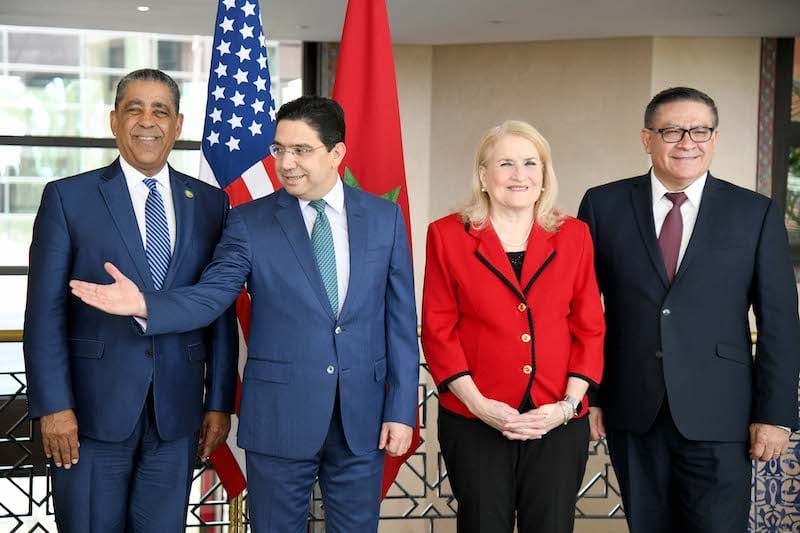
In a recent high-level meeting, the United States and Morocco reaffirmed their commitment to strengthening their longstanding bilateral relationship, with a particular emphasis on expanding military cooperation. The two nations have collaborated closely on security matters for decades, with the US serving as Morocco’s primary arms supplier and defense ally. This renewed commitment comes amid evolving security challenges in North Africa and the Sahel region, as well as shared interests in counterterrorism and stability.
Strengthening a Strategic Alliance
US and Moroccan officials highlighted their shared objectives during meetings focused on bolstering defense capabilities, intelligence sharing, and training initiatives. The US has been the largest arms supplier to Morocco for years, providing advanced defense technology, equipment, and training as part of a broad strategy to enhance Morocco’s defense posture. Recent arms deals have included the sale of F-16 fighter jets, Abrams tanks, and Patriot missile systems, further solidifying Morocco’s position as a regional security partner for the United States.
The partnership between the two countries is not limited to arms deals alone. They conduct regular joint military exercises, most notably the annual African Lion exercise, which involves thousands of troops from both nations and other allies. This training program, one of the largest in Africa, is designed to improve interoperability between US and Moroccan forces and enhance their capabilities to address complex regional threats.
Shared Interests in Security and Stability
Beyond military cooperation, the US-Morocco partnership is grounded in shared objectives for regional stability. With North Africa and the Sahel facing growing threats from extremist groups, Morocco has emerged as a critical player in counterterrorism efforts. The US has praised Morocco’s leadership in promoting moderate interpretations of Islam and countering extremist ideologies, and the two countries have worked together to strengthen intelligence-sharing frameworks.
Morocco’s role as a mediator in regional conflicts and its diplomatic ties with multiple African nations also align with US interests in promoting peace and security in Africa. For Washington, Morocco is an ideal partner that can help counterbalance instability across the region. This partnership extends to economic and cultural ties as well, with both nations investing in initiatives that foster development and promote trade and investment.
Growing Influence in Regional Dynamics
Morocco’s strategic importance has grown in recent years, especially following its normalization of relations with Israel under the Abraham Accords. The US has supported Morocco’s efforts to deepen relations with Israel, and trilateral cooperation between the US, Israel, and Morocco has opened new pathways for diplomacy and economic development. This trilateral dynamic adds another layer to Morocco’s value as a partner, strengthening its regional influence and positioning it as a bridge between the Middle East and North Africa.
Morocco’s autonomy plan for Western Sahara has also received significant backing from the United States, which in 2020 formally recognized Moroccan sovereignty over the region. The move has bolstered Morocco’s diplomatic leverage while solidifying its ties with Washington.
Future Directions for US-Morocco Relations
As the US and Morocco continue to deepen their partnership, officials on both sides have indicated that future collaborations may include cybersecurity initiatives, expanded naval operations, and enhanced counter-narcotics efforts. In addition, both nations have shown interest in investing in Morocco’s renewable energy sector, aligning with broader goals for environmental sustainability and clean energy.
For Morocco, the continued alliance with the US is not only a strategic necessity but also a key element in its broader foreign policy objectives. In a region marked by political and security instability, the partnership with Washington offers Morocco enhanced security and increased international standing. For the United States, Morocco remains an invaluable ally in a region where US influence faces competition from other powers.
Conclusion
The renewed US-Morocco commitment to strengthening bilateral ties and military cooperation underscores the mutual benefits that both nations derive from their partnership. As the US continues to view Morocco as a critical ally in North Africa, Morocco, in turn, looks to the US as a reliable security partner. Together, they are poised to address shared challenges, promote stability, and foster a partnership that could serve as a model for other alliances in the region. With regional dynamics rapidly evolving, the US-Morocco partnership stands as a resilient alliance capable of adapting to meet both current and future security demands.




